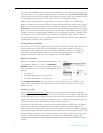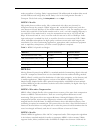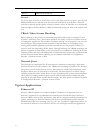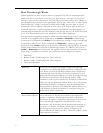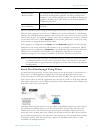
24 © 2008 VBrick Systems, Inc.
Example
To set the Type of Service to all 0's enter 0. To set the Type of Service to all 1's, enter 255. IP
Differentiated Services redefine how the historical TOS field is used. Diffserv allows IP
networks to provide certain Quality of Service features. Note: If uncertain as to whether the
network supports TOS or Diffserv, VBrick recommends setting the TOS to the default value
of 0.
VBrick Video Stream Handling
Packet Ordering is the process of accommodating video packets that are arranged "out of
sequence" when they arrive. This feature optimizes the quality of video in networks that are
less stringently engineered. The condition of packets arriving "out of sequence" can occur for
several reasons. These might include networks having redundant or overlapping routes,
routing table instability problems, local area networks that are not properly switched, or
excessive wide area networking (WAN) delays. Through buffering, the VB6000 rearranges the
delivery of packets to the decoder, so they are received as an ordered set. Enabling the Packet
Ordering feature adds up to 85 milliseconds of additional delay between the encoded stream
and the decoded stream. Packet Ordering can be enabled or disabled in Configuration:
Decoder > Network section of IWS.
Network Jitter
The Jitter Queue compensates for IP network jitter conditions by imposing a slight delay
between the arrival of video packets at the VB6000 and rendering of packets to the decoder.
The process of jitter compensation involves the creation of a buffer that temporarily stores
all packets before they are presented to the decoder. The Jitter Queue uses elastic storage
capability within the buffer, which allows for up to 85 milliseconds of delay variation between
video packets. Enabling the Jitter Queue feature adds 85 milliseconds of additional delay
between the encoded stream and the decoded stream. The Jitter Queue is enabled or disabled
in Configuration: Decoder > Network section of IWS.
Typical Applications
Ethernet IP
Ethernet VBricks operate over standard 100Base-T Ethernet. It is important that the
network is engineered to accommodate the constant payload such that data is delivered
between VBricks without delay, and that the load does not degrade network performance. In
general, operating over Ethernet Switches that are not oversubscribed provides adequate
bandwidth and QoS. For streaming video (e.g. one-way "broadcast") applications, latency in
the network is much less of an issue than for two-way full duplex conference applications.
Bits 6–7 Reserved for future use.





